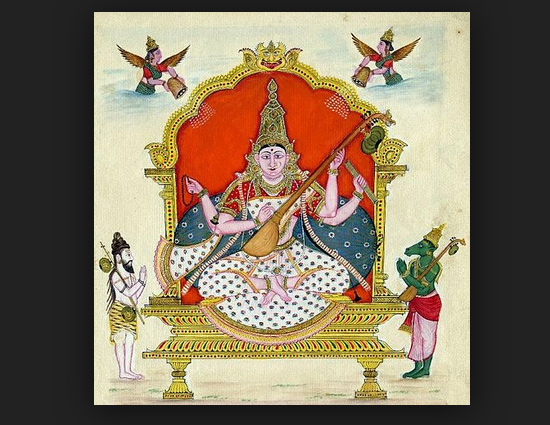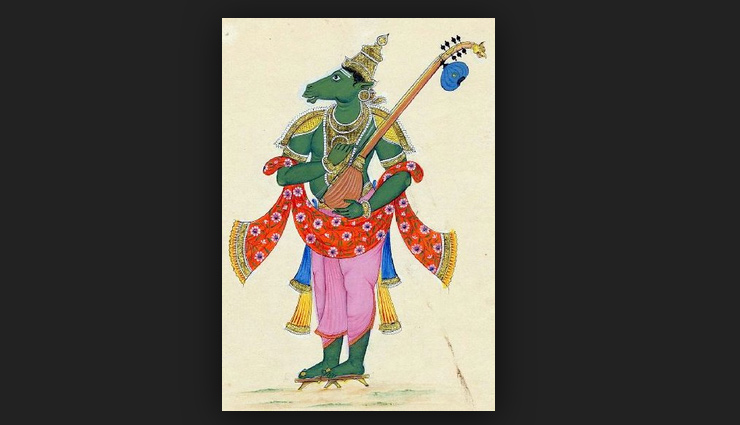Story Of Celestial Musician Of Ramayana- Tumburu
By: Kratika Sat, 14 Oct 2017 4:32:29

In Hindu mythology, Tumburu, also spelt Tumbaru and Tumbara is the best among Gandharvas or celestial musician and is sometimes described as the best of singers. He is described to perform in the courts of gods Kubera and Indra as well as sing praises of god Vishnu. He leads the Gandharvas in their singing.
The Ramayana mentions that Rama – the Avatar of god Vishnu and his brother Lakshmana encountered a demon called Viradha, while in exile in the forest. This demon was the cursed Tumburu. Tumburu once offended Kubera by not bringing Rambha before Kubera at the stipulated time. Enraged, Kubera cursed him to be born as a demon (Rakshasa). Kubera also decreed that Tumburu would be freed from the curse when Rama would slay him. Accordingly, Tumburu was born as Viradha, the son of giant Jaya and his wife Shatahrada. Viradha had two long arms and a fierce appearance. He rushed at Sita, Rama’s wife and caught hold of her and starting running again. Rama and Lakshamana followed him, compelling him to set Sita down. Then, they sat on the demon’s shoulders and chopped off his arms. As Viradha was still alive, the brothers decided to bury him alive. Viradha then told his story to Rama and acquired the form of Tumburu, liberated from the curse and returned to the home of the Gandharvas.
Tumburu is described the son of sage Kashyapa and his wife Pradha. Among the sons of Kashayapa, his four Gandharva sons Tumburu, Bahu, Haha and Huhu were renowned for their sweet and pleasant speech.
Tumburu often described as the best among Gandharvas or celestial musicians. A "mighty singer and musician", he sings in presence of gods. Besides Narada and Gopa, he is regarded the king of songs.[2] Bhagavata Purana considers Narada to be the teacher of Tumburu.The scripture mentions that Tumburu accompanied him on a visit to the court of Yudhishthira (See Mahabharata section). Narada and Tumburu are said to sing the glories of god Vishnu, the Unborn One. Adbhuta Ramayana mentions that Tumburu was the best of all singers and was rewarded by god Vishnu. Narada, a devotee of Vishnu, became jealous of Tumburu. Vishnu tells Narada that Tumburu was dearer to him as he loved songs of praise, rather than austerities that were performed by Narada and sent Narada to an owl named Ganabandhu, to learn music. After learning from the owl, Narada sets to conquer Tumburu. When he reaches Tumburus's house, he sees Tumburu surrounded by wounded men and women, who he discovers are musical Ragas and Raginis, injured by his bad singing. Humiliated, Narada leaves and finally learns proper singing from god Krishna's wives.

Tumburu is mentioned as the courtier of Indra - the god-king of heaven - as well as of Kubera, the god of riches. He is described as a follower of Kubera; his songs usually heard when passing Kubera's abode on Gandhamandana mountain. Tumburu is described as the special friend of Kubera and leads the Gandharvas in music and singing, which is performed by Gandharvas and Kinnaras. Tumburu is described as a "lord of Gandharvas", along with other lords like Haha-Huhu, Parvata, Citraratha. Tumburu is sometimes mentioned as a Muni (sage), rather than a Gandharva. Tumburu is also described to lead Gandharvas to watch the battles of men and goes to Mount Meru to worship with the divine sage Narada and other Gandharvas.
Tumburu is also described as the preceptor of the apsara - divine dancer - Rambha. He is sometimes described as wedded to her. He only suffers a curse due to Rambha (See Ramayana section). Though thought to be as "the martial hero" of the Gandharvas, "yet one of the few yielding to love". In another reference, he is described to have two daughters Manovati and Sukesha, called Pancacudas collectively and who ride the Sun's chariot in the months of Chaitra and Madhu (Vaisakha). Tumburu is said to preside over months Madhu and Madhava (Magha).
In South India, Tumburu is often portrayed horse-faced. He holds the instrument veena that he plays as he sings. In another hand, he holds wooden cymbals, that he beats to maintain the rhythm. A South Indian legend records that Tumburu performed severe austerities and pleased god Shiva. Tumburu asked Shiva to grant him a horse-face, immortality, liberty to travel the universe, skill in music and singing and ability to reside with and serve Shiva. Shiva blessed him and granted the boons that he sought.





